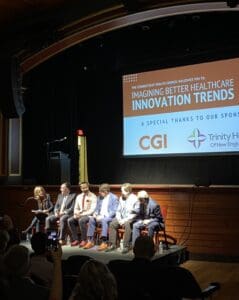 On Thursday, April 28, the Connecticut Health Council, an initiative of the MetroHartford Alliance, hosted Imagining Better Healthcare: Innovation Trends, an in-person event that took place at Infinity Music Hall.
On Thursday, April 28, the Connecticut Health Council, an initiative of the MetroHartford Alliance, hosted Imagining Better Healthcare: Innovation Trends, an in-person event that took place at Infinity Music Hall.
Moderated by Annie Lamont, Co-Founder and Managing Partner of Oak HC/FT, panelists included:
- Jeff Flaks, President & CEO, Hartford HealthCare
- Syed Ahmed Hussain, Senior Vice President and Chief Clinical Officer, Trinity Health of New England
- Charles Lee, FACMG, Scientific Director & Professor, Jackson Laboratory for Genomic Medicine
- Bruce T. Liang, FACC: Interim CEO, UConn Health, Dean of Medicine, UConn School of Medicine
- Juan Carlos Salazar, MD, MPH: Executive Vice President and Physician-in-Chief, Connecticut Children’s
The engaging discussion focused on several pertinent and timely topics about innovation, collaboration, effects of the COVID-19 pandemic, and building a workforce pipeline.
In terms of innovation, moderator Annie Lamont, Co-Founder and Managing Partner of Oak HC/FT, initiated the conversation, saying, “I like to think innovation is a force for good in healthcare.”
Technology
The panelists discussed technology and how it relates to payment alignment by creating alternative payment methods, like telehealth.
“Healthcare is broken,” said Hartford HealthCare President & CEO Jeff Flaks. “We have to be different. We have to be better. To do that, we have to disrupt ourselves. You can resist it or embrace it, and you have to be willing to fail,” he added.
“Transition is critical,” noted Trinity Health of New England Senior Vice President and Chief Clinical Officer Dr. Syed Ahmed Hussain, who added that we need to move from fee-for-service to value and we need to drive changes from an innovation standpoint.
We also need to focus on keeping costs down, added Dr. Bruce T. Liang, Interim CEO, UConn Health, Dean of Medicine, UConn School of Medicine.
“We need to be careful technology is embraced but we don’t forget about what has worked,” underscored Dr. Juan Carlos Salazar, MD, MPH, Executive Vice President and Physician-in-Chief, Connecticut Children’s. He spoke about the need for connectivity to patients and face-to-face interaction, emphasizing balance. “We can’t forget humanity,” he said.
What Dynamic In Connecticut Do We Need To Change?
“There is a resilience to change,” said Dr. Hussain, who also noted that during the pandemic, Connecticut “responded well and did an amazing job so we know we can do it.”
Dr. Liang spoke about focusing on primary prevention and primordial prevention, which prevents the risk factor. He introduced the topic of injections as a cost-saving solution, and the importance of collaborating with others.
“Can the state of Connecticut get from a fee-for-service model?” questioned Dr. Salazar. “It can be done and it will increase care.”
Dr. Lee is another advocate for value-based health. He spoke about how his work is entrenched in genomics, which “help us understand who we are and prevents diseases.”
Staffing and Talent Recruitment
With regard to staffing and recruiting people to jobs in the healthcare industry, “It’s never been more challenging. The pandemic created new circumstances,” said Flaks. “We need to create more training opportunities.”
Dr. Liang noted an increase in class size at UConn School of Medicine and shared that 80% of attendees come from Connecticut, “They want to stay here to support their families,” he said.
In terms of workforce development, Dr. Liang said, “We need to grow our own talent.” He spoke about UConn’s pathway program and emphasized that “we couldn’t do that without our partners.”
Dr. Lee talked about how education is part of the workforce development at JAX. “There is a need for people trained in data sciences,” he affirmed.
“JAX is a global organization. The diversity of people brought in from all over is our strength,” Dr. Lee added. “We’re adding to a cluster of what’s already here. They’ve stayed. They love it here.”
Collaboration and Partnerships
The panelists agreed that collaborating and forming partnerships was key to Connecticut’s success—and creates avenues for innovation.
During the height of the pandemic, “We felt that having support from the top was critical. It was an example of public health collaboration,” said Dr. Liang.
“Collaboration amongst organizations and community was extraordinary,” agreed Flaks. “There was a huge impact and invaluable lessons learned.”
